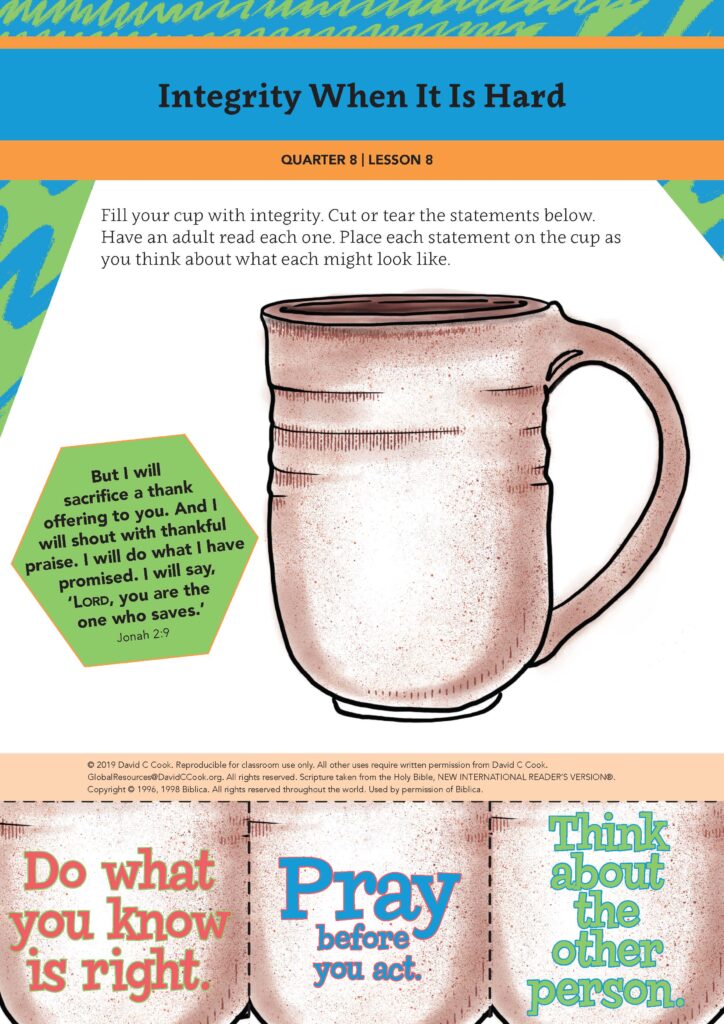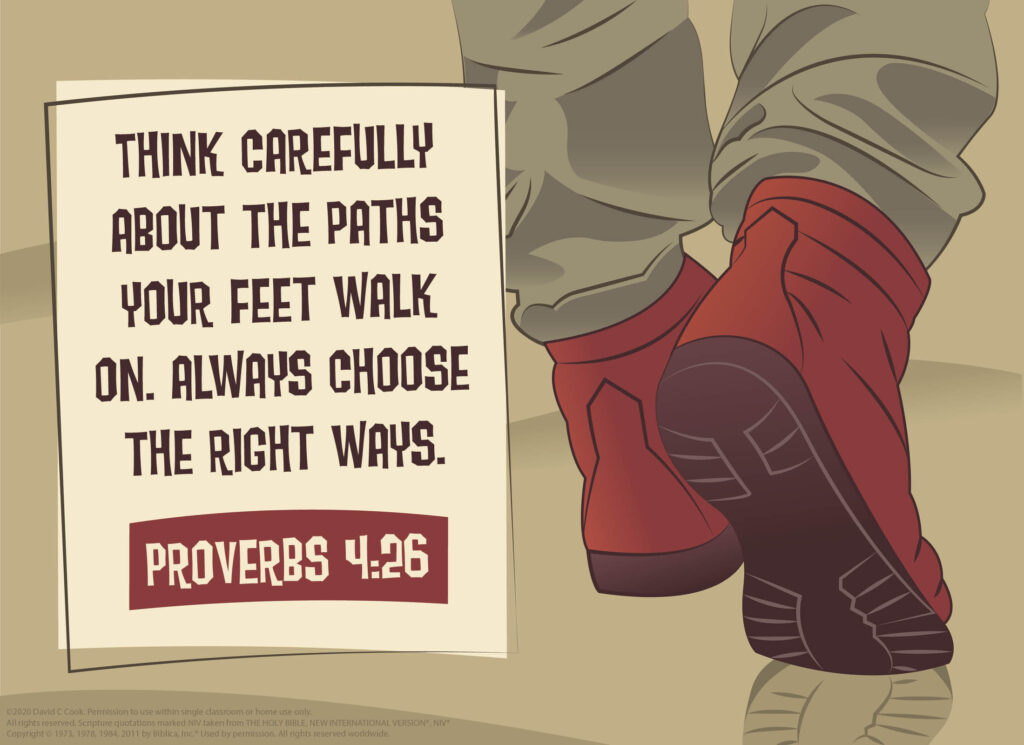During the lesson, the information for you to know is written in regular type, and what we suggest speaking or reading aloud to children is in bold. All resources for this lesson, including the Teacher Guide, Student Page, Family Connection Card, and other resources can be downloaded in a ZIP file by clicking on the following link:
In some lessons you will find "resource articles." These are articles written by experts from around the world to help equip you for your work with children and adolescents. Share them with parents or guardians if you consider it appropriate.
Before class, fill half the cup with dirt and cover the top of it with something like cloth or paper. Make sure the outside of the cup looks clean. You will use this for the Connecting section of the lesson.
Let us not become tired of doing good. At the right time we will gather a crop if we don’t give up.
Galatians 6:9
Have you ever felt discouraged in the midst of doing what was right? Maybe you faced persecution for standing up for the truth. Perhaps you experienced a trial that did not seem fair. Maybe a righteous choice led to a loss. Sometimes it is hard to have integrity. True integrity is not based on circumstances; it is the fruit of a life centred on Christ.
Whether it is easy or difficult to do what is right, when we have integrity, we reflect His character and bring Him glory. Doing what is right may not always be easy, but it always leads to His best path for us. Are you feeling weary of doing good? Do not allow the enemy to discourage you.
Be encouraged that God promises you a harvest if you walk in integrity and do not give up.
Encourage families to talk to their children about doing the right thing when it is hard. What is a time when you did what was right or told the truth? What happened?
Teacher Tip: If possible, email or text the Family Connection Card to the families of your students.
Greet the children as they come to class. Ask each child to find a partner and sit in a big circle. Have the children tell their partners about something they did or saw this week that showed integrity.
Today we will continue to talk about integrity. Does anyone remember our definition of integrity? Let’s say it together.
Integrity means trying to do what is right always and everywhere.
Hold the cup up so that the children cannot see what is inside. Then take the covering off and walk to the middle of the circle, holding the cup so that the children cannot see inside of it.
What do you notice about this cup?
It is clean. There is something inside it. It is (colour).
Raise your hand if you think the cup is clean. When we look at the outside of the cup, it looks clean.
What do you think the inside of this cup looks like?
Allow 2–3 children to respond.
Walk around the circle and allow the children to look at the inside of the cup.
Raise your hand if you still think the cup is clean. You are right. The cup is actually really dirty! Sometimes, even when people seem to live in good ways, they may actually be filled with hurt, doubt, or sin. Even if they do the right thing sometimes, it may not be for the right reasons. They may be like the cup that looks clean outside but is filled with dirt inside.
Just as you could not see inside the cup at first, we cannot always see integrity because it is what happens on the inside of a person. When life gets difficult, it can be especially difficult to have integrity on the inside.
Today we will hear a story about a man who had a difficult time acting with integrity. This man’s name was Jonah, and he was a prophet. In the Bible, prophets were people who heard what God wanted and delivered or carried out messages from God.
God asked Jonah to deliver a message to some enemies. God wanted Jonah to love his enemies and help them. In the book of Luke, Jesus tells us how we can do this.
Read this verse directly from your Bible.
Do to others as you want them to do to you.
Luke 6:31
In a true story from the Bible, God spoke to Jonah. Listen to what God told him.
Go to the great city of Nineveh. Preach against it. The sins of its people have come to my attention.
Jonah 1:2
Nineveh was not a place Jonah wanted to visit. The people there were very mean, and they were trying to take over Jonah’s homeland! Yet, God wanted Jonah to go tell them that what they were doing was wrong. It could be very dangerous for someone like Jonah to go and speak to the Ninevites!
Allow 2–3 children to respond to each of the following questions.
If someone threatened to hurt you every time you saw him, would you want to go to his house and play with him?
If you were Jonah, would you do what God asked and go to Nineveh where everyone was mean and unkind?
God asked Jonah to go to the land of his enemies. Jonah was scared. Act like you are scared.
Shake, curl up, or do another action with the children to pretend you are scared. Then ask the children to sit down again.
When God spoke to Jonah, he was near a great big sea, so he decided to take a ship across the sea to get as far away from Nineveh as he could. On his way, there was a big storm that put the ship in danger of breaking apart.
Optional: If possible, share the image from The Action Bible.

Lead the children in pretending to rock back and forth in a ship.
The ship’s crew found out that Jonah worshipped the Lord and that he was running away from Him. They were scared, so they asked Jonah what they should do so that the storm would calm down. Listen to what Jonah said:
“Pick me up and throw me into the sea,” he replied. “Then it will become calm. I know it’s my fault that this terrible storm has come on you.”
Jonah 1:12
What could happen to you if you were thrown into the sea?
I could get hurt. I could drown. I could get lost.
Jonah showed integrity in what he did. He took responsibility for what he had done wrong. He did not allow the other men aboard the ship to suffer for his actions. The men did not want to throw Jonah into the sea, so they tried to get back to land instead. When this did not work, they threw Jonah into the sea.
Lead the children in pretending to throw someone into the sea.
That is when a huge fish came and swallowed Jonah! The Bible tells us that Jonah was alive inside of the fish for 3 days and 3 nights! This gave Jonah some time to think and pray. Jonah prayed and praised God for saving him. Listen to what he said:
Move your hands into a prayer position. Then read the following verse.
But I will sacrifice a thank offering to you. And I will shout with thankful praise. I will do what I have promised. I will say, “Lord, you are the one who saves.”
Jonah 2:9
No one but God could hear Jonah’s prayer. Jonah knew what he should do. God told the fish to spit Jonah out, and it did! Then Jonah showed his integrity by obeying God. Jonah went to Nineveh just as God had told him to.
Lead the children in walking or marching in place as you read the next part. Pretend to call out to people on the street as you read.
When he arrived in the big city of Nineveh, Jonah went through the streets warning people that the city would be destroyed. The people believed Jonah. They stopped eating and drinking. They stopped doing bad things. They listened to what Jonah told them to do. Because the people listened to what God wanted, God did not destroy them.
Ask the children to sit down.
How did Jonah show integrity at this point in the story?
Jonah did what God wanted him to do. He helped the Ninevites.
Jonah showed great integrity by obeying God and telling his enemies the truth! This would be a very happy ending to our story. However, when we hear what Jonah did next, it shows us that integrity is not always easy. When Jonah saw that God was not going to destroy the Ninevites, he became very angry. Listen to what God said to Jonah:
And shouldn’t I show concern for the great city of Nineveh? It has more than 120,000 people. They can’t tell right from wrong. Nineveh also has a lot of animals.
Jonah 4:11
God showed Jonah that He cared for the people of Nineveh. In this true story from the Bible, Jonah struggled with integrity. Let’s do something fun to help us review when Jonah showed integrity and when he did not.
I will tell you a part of the story. If you think Jonah showed integrity, move to this side of our space. If you do not think he showed integrity, move to the other side of our space. We will go through each of the main parts of the story.
For the following activity, you will need to designate 1 side of the space as “showing integrity” and the other as “not showing integrity.” Indicate to the children what each side represents.
Optional: If you are using The Action Bible, read pages 431–435. Then use these pages to review each of the following parts of the story with the children.
Jonah struggled with integrity. When you live with integrity, you do what is right and pleasing to God. Integrity means trying to do what is right always and everywhere.
Here are some ways you can live with integrity, even when it is difficult.
When we listened to the true story of Jonah, we discovered that integrity is not always easy. Sometimes, having integrity means helping those who we do not like or who do not like us. Sometimes speaking with integrity means saying what is true even when others do not. Integrity always means doing what is right even if others will not see or appreciate our actions.
Optional: If you are using cups with dirt for each child, give each child a cup and give a container of dirt to every 4–5 children. Then have the children actually do the actions as outlined below instead of pretending to do them.
Just like Jonah, most of us struggle with integrity at times. Let’s pretend you have a cup. This cup represents a person. Think of a situation you have experienced where someone did not show integrity.
Here is an example: A group of friends is walking home from school. On their way, they see a girl by herself. One child starts to tease her. Then all the other children join him.
The children in this example did not show integrity because they said hurtful words to another child. Think of a situation where someone you know hurt someone else. When you have thought of something, pretend to place a small amount of dirt in the cup.
This dirt shows that our person has not shown integrity. How might we act with integrity instead?
Allow 2–3 children to respond.
Listen to my example situation again: Your friends are walking home from school. On your way, you see a girl by herself. One of your friends starts to tease her. You stop and silently pray to ask God for help. You realize that you would not want to be teased, so you ask your friend to stop teasing her.
What did you do to show integrity in this situation?
I thought about the other person. I stopped to pray before I acted. I did the right thing, even though it was easier to do what my friend was doing.
Instead of teasing the girl, you prayed and asked your friend to stop teasing her.
In the situation thought of, what could the person have done differently in order to show integrity?
Allow 3–4 children to respond.
Thank you for sharing your ideas. Once you know what the person could have done to show integrity, pretend to dump the dirt from your cup. Now the person’s life shows integrity!
Optional: If you are using Student Pages, allow the children to cut or tear out the statements. Read each statement to the children. Pause to allow them to think about the statements before placing them on the cup.

It is not always easy to do the right thing. Sometimes, it would be much easier to do what everyone else is doing or do the wrong thing to stay out of trouble. The way God tells us to live is not always popular. As we think through every choice we make, we must trust God and believe that His ways are best. Our memory verse reminds us to choose the right ways.
If you are using the Memory Verse Poster, show it to the students.
It says:
Think carefully about the paths that your feet walk on. Always choose the right ways.
Proverbs 4:26

Say this verse using the following motions. If you created your own motions for Lesson 5, use your motions instead.
Have the children say the verse with you. Repeat the words 3 times, doing the motions each time.
End class by saying this blessing, based on Jonah 2:9 and Proverbs 4:26, over the children.
Blessing: May you honour God in what you say and do, even when it is difficult. May you choose to walk the right path.
Lead the children in singing this quarter’s song, if possible.
Life on Life ©2020 David C Cook. Reproducible for home or classroom use only. All other uses require written permission from David C Cook [email protected]. All rights reserved.